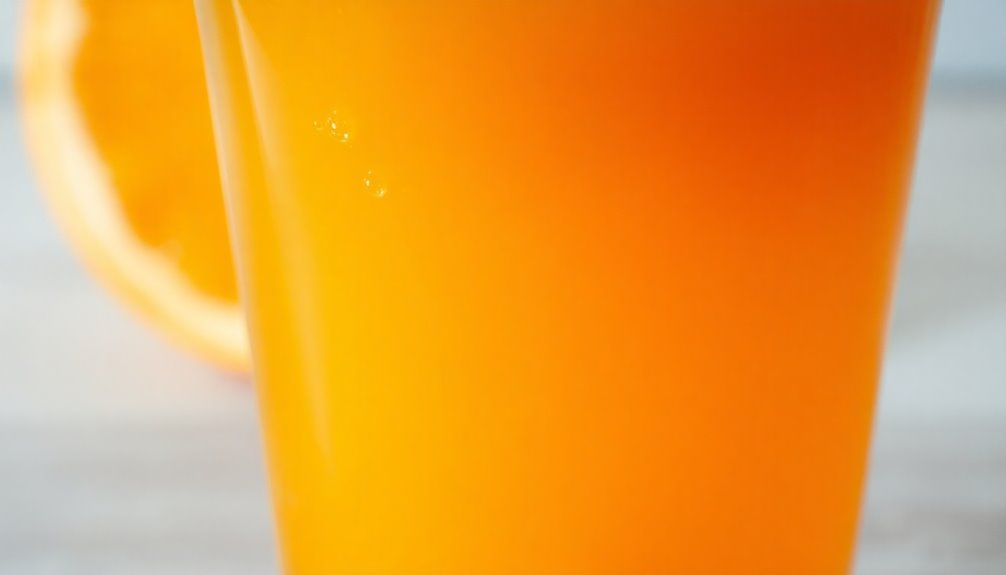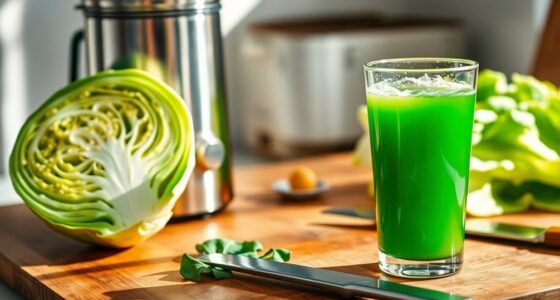To know if your orange juice is bad, start by checking the packaging for any damage, bulging, or an intact seal. Next, pour it into a glass and look for unusual colors or sediments. Take a whiff—fresh juice smells sweet and citrusy. If it has a sour or rancid odor, it's spoiled. Finally, taste a small amount; if it's off-tasting, don't consume it. There's more to learn about keeping your juice fresh!
Key Takeaways
- Inspect the packaging for bulging, damage, or an intact seal, and check the expiration date.
- Pour the juice into a glass and look for unusual masses, mold, or sediment.
- Smell the juice; fresh orange juice should have a sweet, citrusy aroma, while foul smells indicate spoilage.
- Taste a small amount; fresh juice has a tangy flavor, while sour or off-tasting juice means it's bad.
- Always trust your senses—appearance, smell, and taste—when determining juice freshness.

How can you tell if your orange juice has gone bad? It's essential to check a few key indicators to ensure you're not drinking spoiled juice.
First, inspect the packaging of your orange juice. Look for any bulging or bloating, which can signal spoilage due to gas buildup inside. If you notice any signs of damage or tampering, it's best to err on the side of caution.
Next, pour the orange juice into a transparent glass. This step allows you to observe any unusual masses or mold that might be floating in the liquid. If you see any signs of growth, it's a clear indication that the juice has gone bad.
While you're at it, take a moment to examine the color. Fresh orange juice should have a bright, vibrant hue. If it appears darker than usual or has an unusual tint, that's a sign it may be spoiled. A slight darkening can be acceptable, but anything that looks off should raise a red flag.
Smell your orange juice next. This is a crucial step in determining its quality. Fresh juice should have a sweet and citrusy aroma. If you detect a rancid or vinegar-like odor, it's a clear indicator that the juice has gone bad. Your sense of smell is a powerful tool in identifying spoilage, so trust your instincts here. Even if the juice appears fine and the packaging seems intact, a foul smell is a definite no-go.
If the juice still looks and smells acceptable, the final test is to taste a small amount. This is where you'll really find out if your orange juice is still good to drink. If it tastes sour or off in any way, it's time to discard it.
Fresh orange juice should have a tangy, refreshing flavor, not something that makes you scrunch your face in distaste. A bad taste is a sure sign of spoilage, and it's best to avoid any potential stomach issues that could arise from consuming spoiled juice.
Frequently Asked Questions
How Do You Know if Orange Juice Is Gone Bad?
To know if orange juice’s gone bad, start by pouring it into a clear glass and checking for mold, lumps, or strange sediment. Next, give the juice a sniff; if it has an off or rancid smell, it’s best to discard it. Additionally, take a small sip to assess the taste; sour or unusual flavors can indicate spoilage. These steps are essential in learning how to tell if orange juice is bad, ensuring you stay safe and enjoy fresh juice.
Give it a sniff; if it smells rancid or like vinegar, it's time to toss it.
Look at the color—any darkening or fading from its original brightness suggests spoilage.
Finally, taste a little; if it's off or sour, don't risk it—discard the juice immediately.
What Happens if You Have Bad Orange Juice?
If you drink bad orange juice, you might experience symptoms like nausea, vomiting, and diarrhea.
The juice could taste rancid or sour, indicating spoilage. You may also notice visible mold or unusual sediment, which means it's unsafe to drink.
A vinegar-like smell suggests fermentation, making it even riskier for your health.
Improperly stored juice can harbor harmful bacteria, increasing your chances of ingesting toxins that can lead to serious illness.
How Long Does Orange Juice Last in the Fridge?
Think of orange juice like a bright sunrise; it brings freshness to your day but doesn't last forever.
In the fridge, unopened refrigerated orange juice typically lasts about 1 to 1.5 weeks.
Once you crack it open, enjoy it within 7 to 10 days for the best taste.
Freshly squeezed juice, however, is more like a fleeting sunset, lasting only 2 to 3 days.
Store it tightly sealed to keep that vibrant flavor!
What Does Orange Juice Look Like When It Goes Bad?
When orange juice goes bad, you'll notice a few telltale signs.
The color may darken or fade, losing its vibrant hue. You might spot visible mold or unusual lumps when you pour it into a glass.
If the container looks bloated or swollen, that's a red flag too.
Additionally, if the juice appears cloudy or has sediment, it's best to toss it.
Always trust your instincts when it comes to freshness!
Conclusion
In conclusion, trusting your senses is key when it comes to orange juice. If it smells off, tastes sour, or has an unusual color, it's best to toss it. Remember, "when in doubt, throw it out." Keeping a close eye on expiration dates and storage conditions can help you enjoy fresh juice longer. By staying vigilant, you can savor the delicious taste of orange juice without the worry of sipping something spoiled.
Cindy thoroughly researches juicing trends, techniques, and recipes to provide readers with practical advice and inspiration. Her writing style is accessible, engaging, and designed to make complex concepts easy to understand. Cindy’s dedication to promoting the advantages of juicing shines through her work, empowering readers to make positive changes in their lives through the simple act of juicing.

















